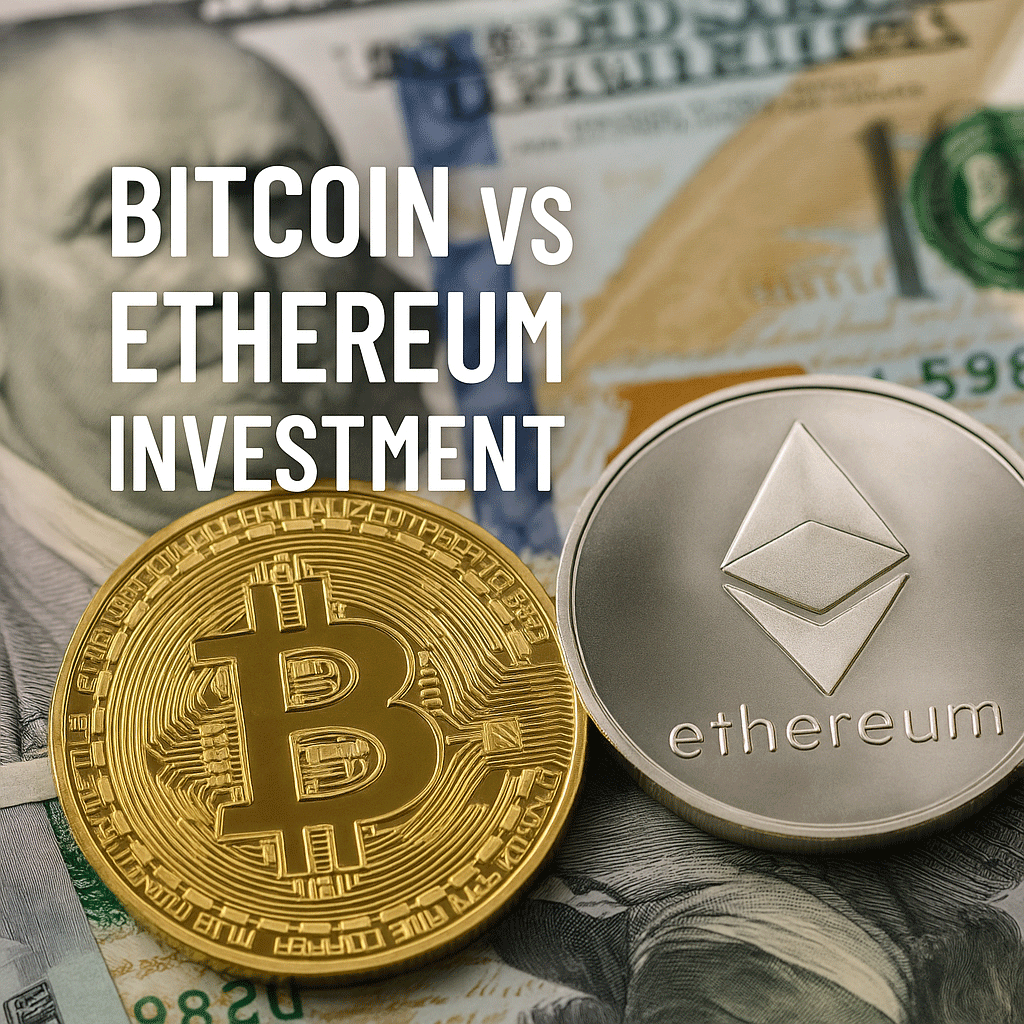Introduction
Bitcoin and Ethereum remain the two most prominent cryptocurrencies in the market. While Bitcoin is primarily recognized as a store of value, Ethereum has established itself as a versatile platform for decentralized applications (dApps). For investors, choosing between these two giants can be challenging. This article delves into the key factors to consider when deciding between Bitcoin and Ethereum investments in 2025.
Bitcoin: The Digital Gold
Bitcoin, launched in 2009 by the pseudonymous Satoshi Nakamoto, was the first cryptocurrency to offer a decentralized, peer-to-peer payment system. With a capped supply of 21 million coins, Bitcoin is often referred to as “digital gold.” This scarcity has driven its value and appeal as a hedge against inflation.
Advantages of Bitcoin Investment:
- Store of Value: Bitcoin is seen as a hedge against inflation and a stable asset over time.
- High Liquidity: Bitcoin enjoys high trading volumes, making it a liquid asset for investors.
- Institutional Adoption: Many institutional investors view Bitcoin as a long-term investment, further stabilizing its market position.
Risks of Bitcoin Investment:
- Volatility: Despite its growing adoption, Bitcoin remains highly volatile.
- Regulatory Uncertainty: Governments worldwide are still shaping their regulatory stance on Bitcoin.
Ethereum: The DeFi Powerhouse
Ethereum, launched in 2015 by Vitalik Buterin, introduced smart contracts and decentralized applications (dApps). Its native cryptocurrency, Ether (ETH), powers transactions and applications on the Ethereum network.
Advantages of Ethereum Investment:
- Smart Contracts and dApps: Ethereum’s blockchain is the backbone of DeFi, NFTs, and many blockchain applications.
- Ethereum 2.0 Upgrade: The transition to Proof of Stake (PoS) has improved network scalability and reduced energy consumption.
- Growing Developer Ecosystem: Ethereum hosts a vast community of developers, leading to continuous innovation.
Risks of Ethereum Investment:
- Scalability Issues: Despite the Ethereum 2.0 upgrade, network congestion remains a concern.
- Competition: New blockchain platforms like Solana and Cardano are challenging Ethereum’s dominance.
Comparing Bitcoin and Ethereum as Investments
| Factor | Bitcoin | Ethereum |
|---|---|---|
| Purpose | Store of Value | Smart Contracts & dApps |
| Supply | Capped at 21 million | Unlimited (but inflationary) |
| Consensus Mechanism | Proof of Work (PoW) | Proof of Stake (PoS) |
| Institutional Support | High | Growing |
| Risk Level | High | High |
Conclusion: Which Is the Better Investment?
Bitcoin and Ethereum serve different purposes in the cryptocurrency ecosystem. Bitcoin is the go-to asset for long-term investors seeking a hedge against inflation, while Ethereum offers exposure to the rapidly expanding world of decentralized finance and smart contracts. Investors should consider their risk tolerance, investment timeline, and overall financial goals when choosing between these two assets.
FAQs
- Which is safer to invest in, Bitcoin or Ethereum? Bitcoin is generally considered safer due to its limited supply and institutional backing. However, Ethereum offers higher potential returns through its smart contract ecosystem.
- Is Ethereum more profitable than Bitcoin? While Ethereum has delivered higher percentage gains in recent years, it is also more volatile and speculative than Bitcoin.
- Can I invest in both Bitcoin and Ethereum? Yes, diversifying your investment across both assets can mitigate risk and provide exposure to both digital gold and the DeFi ecosystem.

 Bitcoin
Bitcoin  Ethereum
Ethereum  Tether
Tether  XRP
XRP  USDC
USDC  Solana
Solana  TRON
TRON  Lido Staked Ether
Lido Staked Ether  Figure Heloc
Figure Heloc